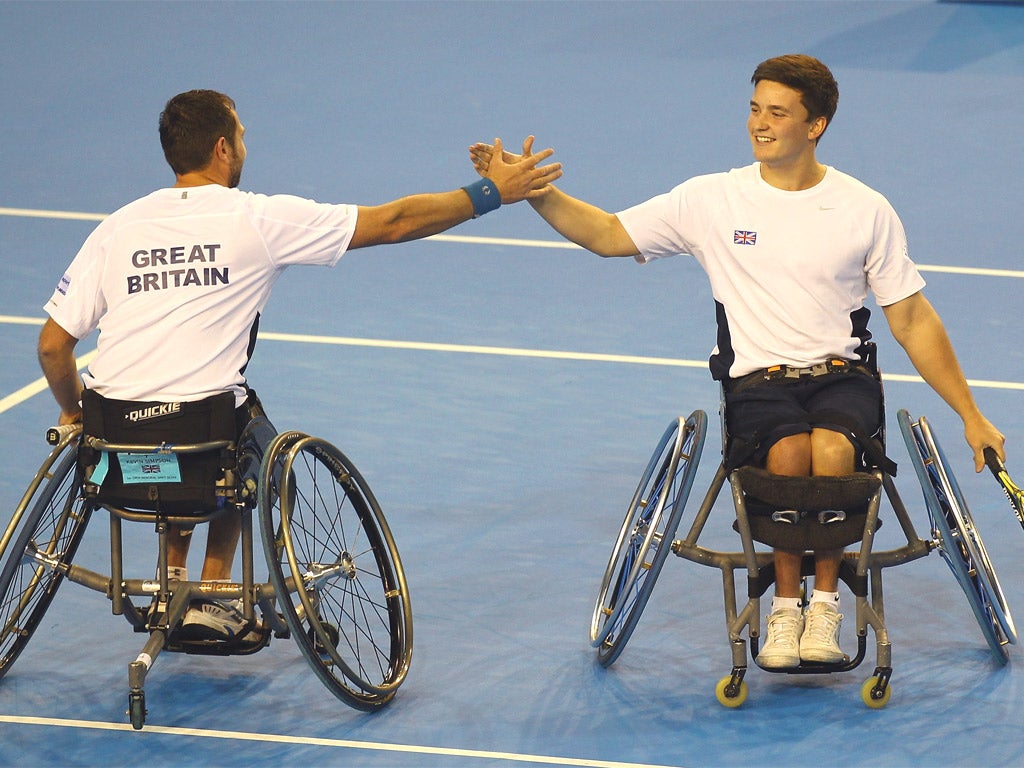Keep off the grass! Why you won't be seeing these tennis players at Wimbledon
Pressure grows on only grand slam without a wheelchair singles contest Wimbledon has yet to fully embrace wheelchair tennis

It might just be the biggest year in the history of the world's most famous tennis club, with the Olympics coming to town in just a few weeks' time. But for the sport's fastest growing contingent – those who play the game on two wheels, not two feet – Wimbledon is certainly not the home of tennis.
Unlike in the French, Australian and US Open, there will not be a 2012 Wimbledon singles wheelchair tennis champion, in either the women's or the men's. Nor will the Paralympic Champion be crowned at the All England Lawn Tennis and Croquet Club.
There has been a doubles competition for wheelchair tennis at Wimbledon since 2009, and while the International Tennis Federation "hopes there will be a singles competition in the future" it is yet to happen.
Singles' wheelchair tennis has been a fixture at the Australian Open for a decade, at the US Open since 2005, and the French since 2007. Its star player, the Dutch woman Esther Vergeer, is almost certainly the most dominant force in any sport, having won 42 Grand Slams and five Paralympics titles (in singles and doubles).
The International Tennis Federation has been in talks with Wimbledon for some time about having a singles competition, meaning all four Grand Slams would be the same, but so far progress has been slow.
That Wimbledon is played on grass is a significant, but not insurmountable, barrier. The All England Club also claims it does not have the courts for an extra tournament. The other Grand Slams are played over 15 days, and long into the night. Wimbledon takes place over 13, stops comparatively early – and occasionally it rains.
"Wimbledon is the only one of more than 170 wheelchair tennis tournaments to be played on grass," said Mark Bullock, wheelchair tennis manager at the International Tennis Federation.
"Integration and evolution in to the Grand Slams has been relatively recent, and only since 2009 have the Slams been considered the pinnacle of the sport. With Wimbledon, as the sport evolves, maybe singles will come in the future.
"The grass courts are certainly a factor. It is more difficult to push, on grass. You can't really push and then glide, in the way you can on hard courts. You have to push the whole time. The chair moves more slowly and you have a slower bouncing ball."
While tennis in the Olympics will be contested at the All England Club, for the first time since 1908 (tennis was not an Olympic sport at the last London games in 1948), the Paralympic competition will be played on specially built hard courts on the Olympic Park at Eton Manor.
As well as singles and doubles, wheelchair tennis has a separate category called "Quads", for quadraplegic athletes who have limited use of their hands and arms. Electric wheelchairs are permitted, and players often have the rackets strapped to their arms. So far this category has only been contested on hard courts.
"Having the Paralympics at Wimbledon was never seriously considered," said Mr Bullock. "The vast majority of the Paralympics is within the Olympic Park at Stratford, we wanted to be part of the main cluster. People will go for the day and watch several sports – that's good for us. At this stage in the game's evolution our players are not well known enough for spectators to make the trek across London. Hopefully in the future that will change."
Rain or shine? Let the guessing Games begin
Today marks one month to go until the start of the Olympics, but tomorrow is arguably the more important milestone. That will be when the 30 day outlook from the Met Office first overlaps with Games time, spawning what will no doubt become the great national pastime of Olympic weather predicting. The current outlook, which runs until 25 July, is not great. More rain and less sunshine on average, and the chances of "very warm conditions" are considered "very low". Stopping short of a long-term forecast, the Met Office has submitted detailed analysis to government officials showing weather conditions in the last 30 years over the Olympic period.
Tom Peck
Join our commenting forum
Join thought-provoking conversations, follow other Independent readers and see their replies
Comments
Bookmark popover
Removed from bookmarks